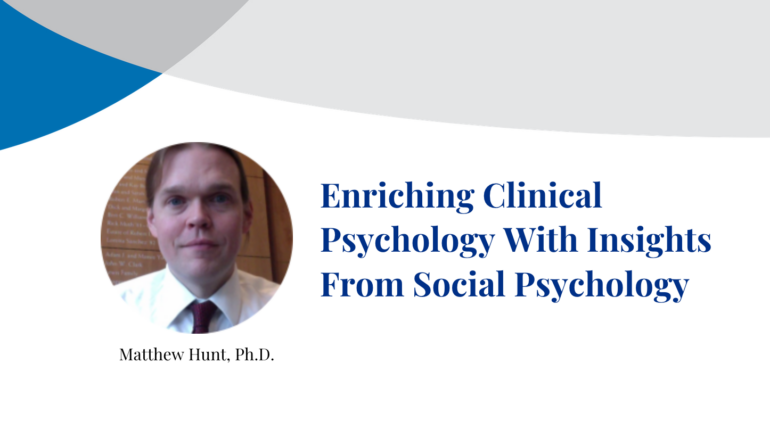People are often surprised to learn that a course in social psychology is an important component in the basic science requirements leading up to the Psy.D. Clinical Psychology. What does social psychology have to do with the assessment, diagnosis, and treatment of mental problems? As it turns out, quite a bit.
While social psychology and clinical psychology are two distinct fields within psychology, they share a common goal: to understand and enhance human well-being. To that end, social psychology explores how the presence of other people can influence an individual’s thoughts, feelings, and behaviors via the interaction of internal and external factors. Viewed in this light, virtually everything that clinicians do with respect to their clients occurs in a social context and is thereby subject to the various influences studied within social psychology. Thus, the insights gained from such research help to inform and enrich the practice of clinical psychology.
As a basic science, social psychology provides a foundational understanding of human behavior, shedding light on the underlying mechanisms that drive our thoughts, emotions, and actions. Social psychologists have uncovered fundamental principles such as conformity, obedience, social comparison, and attribution, which help explain how individuals perceive, interpret, and react to their social environment. Clinicians can utilize these insights to effectively assess, diagnose, and intervene in a wide range of mental health conditions. For instance, understanding the concept of attribution bias, where individuals tend to attribute internal causes to their own successes and external causes to their failures, can help clinicians address cognitive distortions that contribute to depression and anxiety.
Moreover, social psychology offers a unique perspective on the role of interpersonal relationships and social contexts in mental health. Social psychologists have demonstrated the profound impact of social support, social isolation, and social stigma on emotional well-being. These findings inform clinical interventions that emphasize the importance of building supportive relationships, fostering resilience in the face of social challenges, and addressing the negative consequences of social stigma. For example, group therapy, a cornerstone of many clinical approaches, harnesses the power of social connection and shared experiences to promote healing and recovery.
Finally, social psychology provides valuable tools and techniques for intervention and prevention. Social psychologists have developed effective strategies for behavior change, attitude modification, and prejudice reduction. These strategies can be readily adapted and applied within clinical settings to address a range of mental health concerns. For instance, cognitive-behavioral therapy (CBT), a prominent approach in clinical psychology, draws upon social psychological principles of learning and behavior modification to help individuals identify and modify dysfunctional thoughts and behaviors.
Social psychology, with its focus on social influences, interpersonal dynamics, and the impact of social contexts, serves as a vital complement to clinical psychology. By integrating social psychological insights into clinical practice, clinicians can gain a more comprehensive understanding of their clients’ experiences, develop more effective interventions, and foster a supportive environment that promotes healing and well-being.

